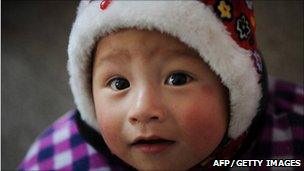China in lead poisoning 'cover-up' - Human Rights Watch
- Published

A Chinese child waits to be tested for lead poisoning in January
China has been accused of trying to cover up the extent of lead poisoning among children, and of blocking effective testing and treatment.
A report by Human Rights Watch says local authorities in heavily-polluted industrial areas have been sending sick children back to contaminated homes.
It says that in these areas - Henan, Yunnan, Shaanxi and Hunan provinces - anyone who complains is being harassed.
China has promised to clean up chronic pollution from heavy metals.
But reports of poisoning remain widespread - hundreds of thousands of children are suffering from lead poisoning, the HRW report, external says.
It says that parents are being denied the right to tests and medical help, and says the government should stop delaying a meaningful response as the problem would damage future economic growth and health care.
Fearful ignorance
"Children with dangerously high levels of lead in their blood are being refused treatment and returned home to contaminated houses in polluted villages," said Joe Amon, the health and human rights director at Human Rights Watch.
There was no immediate response from the Chinese government to the allegations.
The report was based on interviews conducted with 52 parents and grandparents whose children or grandchildren have lead poisoning, as well as five journalists who had reported on the subject.
Lead poisoning often comes from smelting or recycling plants, or as in a recent case factories making tin foil.
The researchers found that parents often had little understanding of why their children did not grow properly, had anaemia or hearing loss.
"They didn't know what was happening," Mr Amon told the BBC's Annemarie Evans in Hong Kong.
"They took their kids into the clinic. They were told they lived too far from the factory to get tested for lead, or they were told the kids had lead in their blood but there was nothing that could be done for it."
Earlier this year, battery factories across China were closed and about 74 people detained after reports that more than 100 people were affected by lead and cadmium poisoning.
Another more recent case, in Zhejiang, involved 600 people, including more than 100 children, suffering poisoning from tinfoil processing workshops.
- Published30 May 2011
- Published7 January 2011
- Published6 January 2011